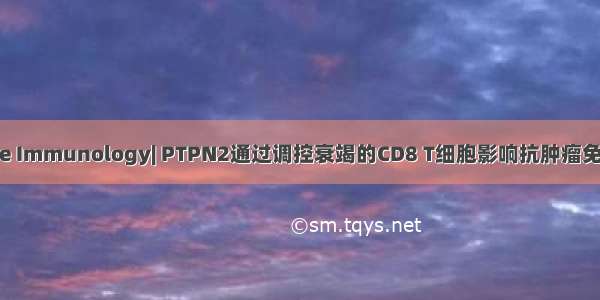
Paper Reading
01
PTPN2 regulates the generation of exhausted CD8+ T cell subpopulations and restrains tumor immunity
Martin W. LaFleur, Thao H. Nguyen ,Matthew A. Coxe, et al..
Nature Immunology
Previously, it is well known that exhausted CD8+ T cells are dysfunctional and prevail in inflammatory diseases, including chronic viral infection and cancer. In addition, researchers have revealed that exhausted CD8+ T cells can further be separated into Slamf6+ progenitor exhausted and Tim-3+ terminally exhausted subpopulations. However, the molecular mechanisms underlying this phenomenon remain to be further explored. Here these authors utilized knockout methods and identified the phosphatase PTPN2 as a key regulator of exhausted CD8+ T cells, especially the differentiation of the terminally exhausted Tim-3+ subpopulation by impairing the type 1 interferon signaling. In detail, loss of Ptpn2 in CD8+ T cells promotes the proliferation and cytotoxicity of Tim-3+ subset without altering the numbers of Slamf6+ cellsin a LCMV infection model. Similarly, in a tumor model, deletion of Ptpn2 in CD8+ T cells enhanced the anti-tumor immune responses of Tim-3+ cells, limited tumor growth and improved PD-1 checkpoint blockade effects. Taken together, their data revealed PTPN2 as a negative regulator of cytotoxic Tim-3+CD8+ T cells and implicate PTPN2 as an immunotherapy target in CD8+ T cells.
02
CD103hi Treg cellsconstrain lung fibrosis induced by CD103lo tissue-resident pathogenic CD4 T cells
Tomomi Ichikawa, Kiyoshi Hirahara,Kota Kokubo, et al..
Nature Immunology
As previously outlined, in non-lymphoid tissues, tissue-resident memory T cells crucially contribute to adaptive immune responses to environmental stimuli. However, the potential pathogenic influence and functional heterogeneity of these tissue-resident CD8+ T cells remains to be further explored, especially in the context of chronic inflammatory lesions. Here these authors revealed that repeated exposure to Aspergillus antigen resulted in chronic lung inflammation and lung fibrotic responses, which is accompaniedand driven by CD69hi CD103lo CD4+ TRM cells. In detail, these TRM cells produced effector cytokines and promoted fibrotic responses induced by Aspergillus fumigatus antigens. Interestingly, they observed that the immunosuppressive CD69hiCD103hi Foxp3+ CD4+ regulatory T cells were also induced and restricted the ability of pathogenic CD103lo TRM cells to cause fibrosis. Taken together, these authors gave a whole landscape of immune responses in lung after Aspergillus fumigatus infection. And lung tissue-resident CD103hi Treg cells constrain lung fibrosis induced by CD103lo tissue-resident pathogenic CD4 T cells.
END
如果觉得《Nature Immunology| PTPN2通过调控衰竭的CD8 T细胞影响抗肿瘤免疫反应》对你有帮助,请点赞、收藏,并留下你的观点哦!













